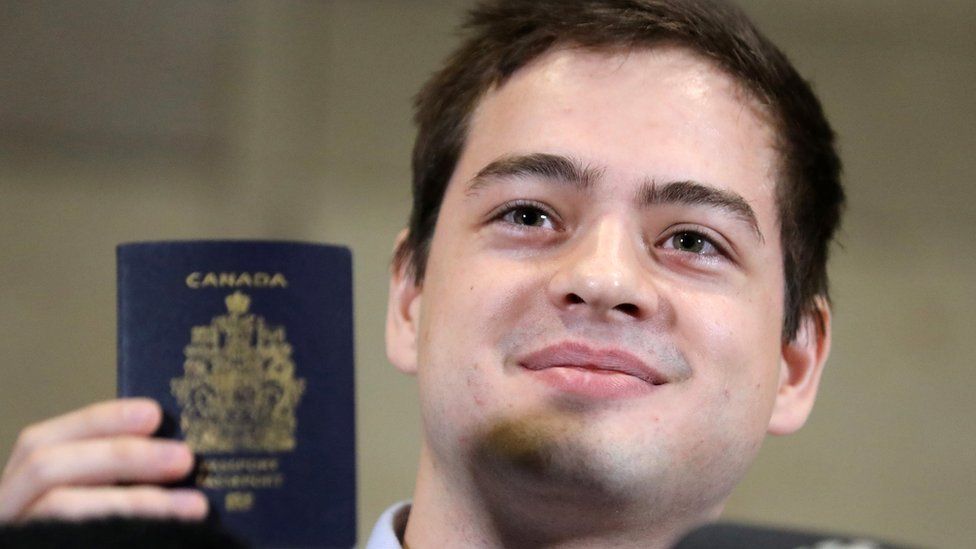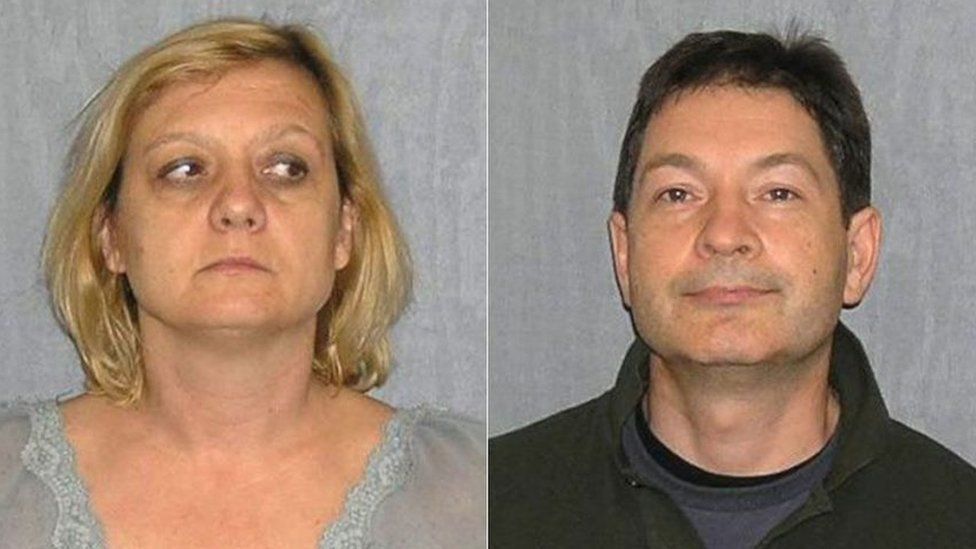
Alexander Vavilov says he "feels Canadian"
The son of Russian spies has spoken of his relief after a court decided to let him keep his Canadian citizenship.
Alexander Vavilov had his citizenship revoked after his parents, who worked for Russia's foreign intelligence service, were arrested in 2010.
He was born in Canada, and until their arrest he believed his parents were Canadian too.
It is the first time he has spoken since Canada's Supreme Court ruled his citizenship was valid.
"I am who I am - whatever you learn about your heritage I don't think it defines you as a person," Mr Vavilov told the media in Toronto on Friday.
He said the court victory was recognition that he not only feels like a Canadian, but is one in the eyes of the law.
Who is he?
Mr Vavilov was born Alexander Foley in Toronto on 3 June 1994 to Tracey Lee Ann Foley and Donald Howard Heathfield - or so he thought.
Their real names were Elena Vavilova and Andrey Bezrukov and they had moved to Canada using false identities, in order to establish a "deep cover" that would allow them to travel the world and spy for Russia's KGB.
In Canada, they seemed like a normal, happy young family. Mr Vavilov's older brother Timothy was born just four years before, also in Toronto. At one point, his parents started up their own diaper delivery service.

Russian spy Elena Vavilova used the name Tracey Ann Foley; Andrey Bezrukov called himself Donald Heathfield
When he was two, the family moved to France and then later to the US, settling near Boston.
That's where they were apprehended by the FBI in 2010, when Mr Vavilov was 16.
They pleaded guilty and were deported to Russia in a spy swap in exchange for four Russians who had been imprisoned by Moscow for providing intelligence to the West.
The family's story inspired the US television show The Americans, about two deep undercover Russian spies living and starting a family in the United States.
Mr Vavilov said he watched the series - as have his parents who now live in Russia.
"On the one hand you can relate to some things, on the other it's Hollywood," he said.
He has managed to heal the relationship with his parents in the years since their secret was revealed and his life turned upside down.
His parents were motivated by patriotism, he said.
"Although I have suffered through all this, I understand why they did what they did."
Legal fight
Shortly after his parents were apprehended in the US, Mr Vavilov's passport was not renewed, and his citizenship was revoked in 2014 by an official working for Canadian immigration.
The government said that since his parents worked for a foreign government at the time of his birth, being born on Canadian soil was not enough to grant him citizenship.
Thus began Mr Vavilov's long fight to restore his citizenship.
Typically, being born in Canada grants a child automatic citizenship. But there are exceptions for the children of diplomats. The government said that exception should apply to him - Mr Vavilov's legal team disagreed.
On Thursday, the Supreme Court ruled that since his parents were not granted diplomatic status, his citizenship is valid.
What comes next
Since losing his Canadian citizenship, Mr Vavilov said he went to university in Europe and has worked in the Middle East and Asia.
But he said he sometimes struggled to find employment because of his life story.
"I don't think people distrust me personally," he said. "But I think people don't want to be tied to the association."
Asked about his thoughts on Russia and its leadership, Mr Vavilov, who now also holds Russian citizenship, declined to comment.
He told the media that he wants a future in Canada but his next steps depend on his prospects - he will move back for a good work opportunity.
Thursday's court decision means his older brother Timothy will also keep his Canadian citizenship, though Mr Vavilov was not aware of his future plans.
The Vavilov brothers have always maintained they were completely in the dark about their parents' spying activities.
Various media reports have cited unnamed US officials suggesting that Timothy Vavilov's parents had revealed their identities to him and wanted him to follow in their footsteps.
On Friday the younger Mr Vavilov dismissed those reports, saying they were untrue.